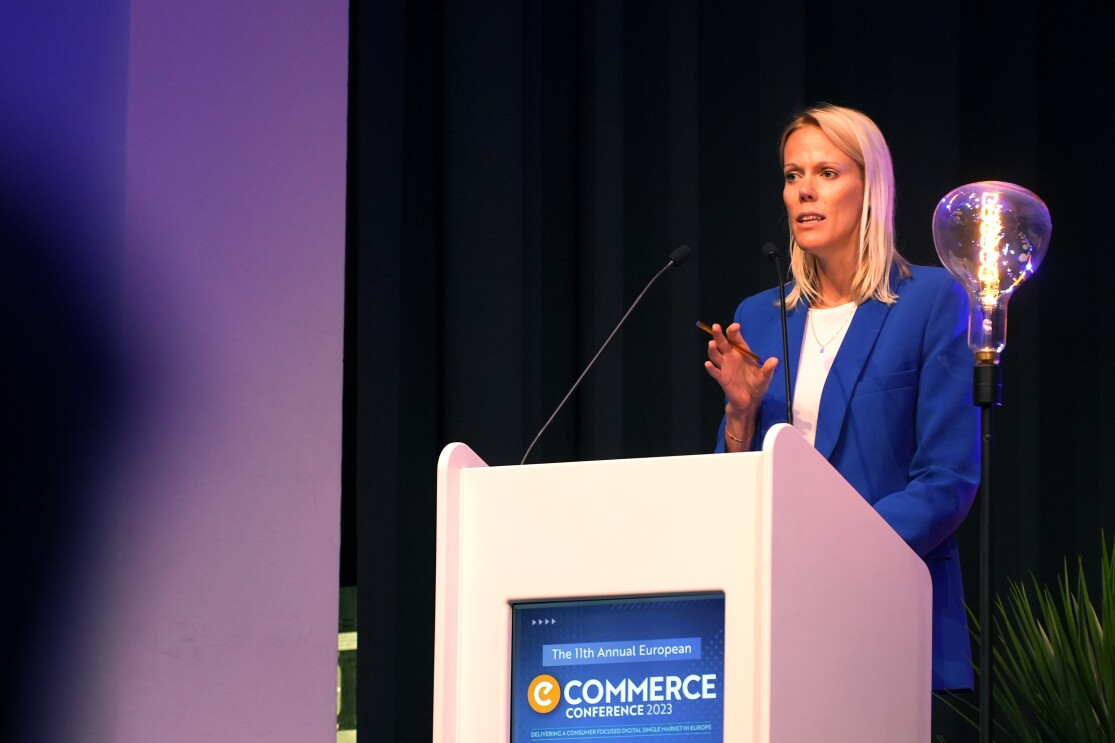Belgium Country Manager, Eva Faict, was the first keynote speaker before the panel discussions began.
The following are remarks by James Waterworth, Amazon’s Director for EU Public Policy, during the first panel of the conference, entitled ‘The New Consumer Agenda: Delivering Online Fairness for Consumers’.

Building on the successful European Commission Consumer Summit in March, a high-level dialogue hosted by industry, with the key stakeholders, it is crucial to constructively debate the key challenges and opportunities in delivering for consumers.
Amazon aims to be Earth’s most customer-centric company: we know that unless we provide a consistently excellent customer experience, customers will not choose to shop with us or use our services. We invest constantly in building customer friendly, easy to use and effective services. For example, our customers can find help anywhere on our store within one click and be in touch with our customer service team via chat, email or phone.
We fully support the EC and consumer groups’ goals to ensure consumers are well protected, online and offline, being provided with great service, irrespective of how or with whom they contract. We are committed to engage constructively in ensuring the legal framework is fit for purpose, fosters innovation, and delivers the potential of the EU Single Market for consumers and companies of all sizes. As such, we can use our own experience to serve customers to provide input into the crucial debates.
It is crucial to constructively debate the key challenges and opportunities in delivering for consumers.
Non-legislative best practices
This EC mandate demonstrated that cooperation with stakeholders can be very impactful. The EU Product Safety Pledge is a good example of working together across the consumer ecosystem, including with consumer groups, to deliver tangible results for consumers; as well as the EC COVID-19 cooperation mechanism, another great example of effective and timely cross-stakeholder cooperation.
The current EC mandate (2019-2024) has been extremely challenging for economic operators, consumers and policy makers, due in part to the COVID-19 pandemic, as well as economic and geopolitical challenges. In parallel, the EU adopted a large number of ambitious reforms, including the DSA/DMA/Omnibus/GPSR and others. Many of these legislative proposals are yet to be fully implemented or enforced, while others are being finalised or still debated.
The EU Product Safety Pledge is a good example of working together across the consumer ecosystem, including with consumer groups, to deliver tangible results for consumers.
Looking forward: Next European Commission mandate
The focus should be on ensuring existing legislation is effectively enforced and time is needed to properly evaluate the effects of the existing rules, allowing for any lack of clarity to be addressed. Additionally, we believe, many of the issues flagged in the current digital fairness consultation are already covered by the existing framework. Going forward, our recommendations to ensure there is fairness for consumers online are:
- Flexibility and dynamism: The framework should be flexible enough and future proof to ensure it helps deliver the innovation needed for tomorrow’s consumers and businesses - as all types of services, including retail, are rapidly changing and evolving. The framework should foster effective information provision. The rules should be appropriate for rapid technological development and omni-channel retail reality (e.g. click and collect, home assistants, connected homes and devices where consumers may no longer use screens), protecting consumers irrespective of the size of the trader, be it online or offline. The framework should allow consumers to be free to decide when they receive information about the products and services they have purchased.
- A level playing field: Consumers should be protected in a clear and consistent way across the EU, irrespective of whom they contract with or where they contract. The framework should contribute to economic growth in the EU Single Market, establishing a level playing field. The rules should be proportionate, coherent, effective and easy to implement for companies of all sizes, including SMEs. They should contribute to legal certainty for consumers and businesses.
- Effective enforcement: Rules should be enforced effectively in a harmonised approach across the EU. Legal fragmentation leads to increased complexity for businesses of all sizes and consumers. Fragmentation limits the potential of the EU Single Market in delivering innovative products that answer to the key societal priorities. From our side, in October 2022, we expanded our legal efforts to shut down fake review brokers, filing our first criminal complaint in Italy and our first lawsuit in Spain. Amazon has devoted significant resources to investigating and bringing legal actions against fake review brokers to stop them from orchestrating fake reviews in our Store.
SMEs, Single Market and business interaction
You’ve heard me mention small and medium-sized enterprises (SMEs) a few times there. Amazon has enhanced the Single Market by connecting customers and sellers across Europe. We now have eight EU Stores, which serve millions of customers all over the EU27 and facilitate business for more than 225,000 European SMEs who use our Stores to sell.

We believe the Fitness Check is an opportunity to evaluate potential simplifications and to reduce the administrative burden so that more traders, of all sizes, but especially SMEs, as well as consumers can take advantage of the full potential of the EU Single Market.
We encourage policy makers to engage with businesses and representative trade associations to identify ways to estimate compliance cost and effectiveness, in support of simplification measures that are equally positive for consumers and in support of businesses. We welcome the EC’s commitment to data-driven enforcement, and encourage focusing on empirical input to policy making.









